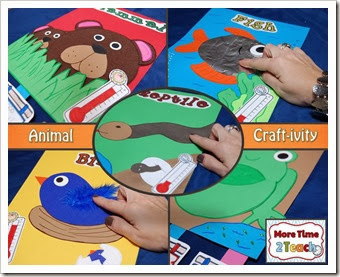 A few weeks ago, Jo-Ann Fabric and Craft Store contacted me about taking part in their #teachercreativity Blog Hop. That’s when I got an idea about creating a craft-ivity to add to my upcoming animal unit. You see every year my 3rd graders and I spend some time learning about the different animal groups. We read books, watch videos, play animal classification games online, (click here, and here to see some of those games) and talk about unique animal characteristics. But this year I wanted to include something for my visual and kinesthetic learners…especially since this is how my group tends to learn best. I understand where they’re coming from being a HUGE visual learner myself. (You know you’re visual when your husband grabs napkins at a restaurant to draw pictures for you.)
A few weeks ago, Jo-Ann Fabric and Craft Store contacted me about taking part in their #teachercreativity Blog Hop. That’s when I got an idea about creating a craft-ivity to add to my upcoming animal unit. You see every year my 3rd graders and I spend some time learning about the different animal groups. We read books, watch videos, play animal classification games online, (click here, and here to see some of those games) and talk about unique animal characteristics. But this year I wanted to include something for my visual and kinesthetic learners…especially since this is how my group tends to learn best. I understand where they’re coming from being a HUGE visual learner myself. (You know you’re visual when your husband grabs napkins at a restaurant to draw pictures for you.) 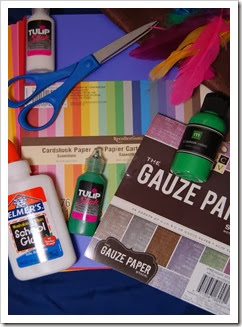 To get started, I used a few basic craft supplies that I found at one of my favorite stores, Jo-Ann Fabric and Craft Stores. The best part is that they have a Teacher Rewards program where you can save 15% on every purchase in store or online. {To register simply click on the image below. When you enroll, you will also get a 20% bonus coupon sent to your email.}
To get started, I used a few basic craft supplies that I found at one of my favorite stores, Jo-Ann Fabric and Craft Stores. The best part is that they have a Teacher Rewards program where you can save 15% on every purchase in store or online. {To register simply click on the image below. When you enroll, you will also get a 20% bonus coupon sent to your email.}  Getting back on track with the Animal Craft-ivity… The goal of the first project was to help my students remember that fish have skin made up of scales, they lay millions of tiny eggs, breathe through gills, live in the water, and are cold blooded. Wow, that’s A LOT of information… so let’s get started.
Getting back on track with the Animal Craft-ivity… The goal of the first project was to help my students remember that fish have skin made up of scales, they lay millions of tiny eggs, breathe through gills, live in the water, and are cold blooded. Wow, that’s A LOT of information… so let’s get started.  In order to create a scaly texture on the fish, I first traced a body for my fish onto aluminum foil. I then used 1 inch circles that were cut in half and glued them to the BACK side of the fish.
In order to create a scaly texture on the fish, I first traced a body for my fish onto aluminum foil. I then used 1 inch circles that were cut in half and glued them to the BACK side of the fish. 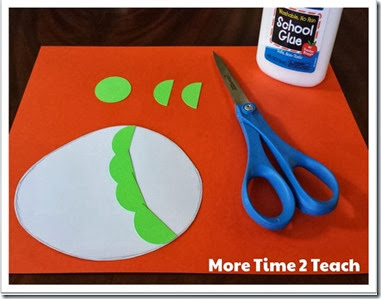 (In the picture above, the scales are glued onto white paper, but for this project remember to use aluminum foil. See the picture below)
(In the picture above, the scales are glued onto white paper, but for this project remember to use aluminum foil. See the picture below)  Next, flip the body of the fish over so that you cannot see the scales and use your fingers (NOT nails) to rub on the foil until the scales begin to appear like so…
Next, flip the body of the fish over so that you cannot see the scales and use your fingers (NOT nails) to rub on the foil until the scales begin to appear like so… 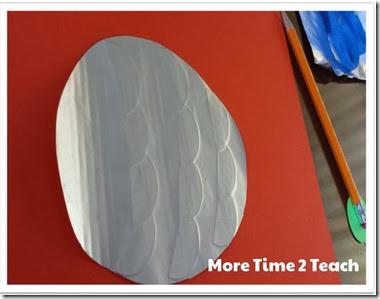 Pretty cool huh? Next, I added the tail, fin, and eye. I also used Tulip fabric paint (like puffy paint) to make dots representing the million of tiny eggs fish lay. The following craft-ivity was actually one of my favorites and the trickiest to come up with. It’s not easy recreating smooth, wet animal skin…
Pretty cool huh? Next, I added the tail, fin, and eye. I also used Tulip fabric paint (like puffy paint) to make dots representing the million of tiny eggs fish lay. The following craft-ivity was actually one of my favorites and the trickiest to come up with. It’s not easy recreating smooth, wet animal skin… 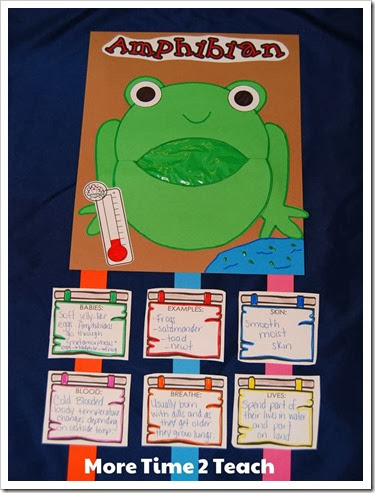 When it comes to amphibians and reptiles, kids tend to get a bit confused. They can’t quite remember if it’s the amphibian or the reptile with smooth, moist skin. To create a moist, smooth skin texture, I used a ziploc bag with a few drops of green paint. You can see the green baggie below.
When it comes to amphibians and reptiles, kids tend to get a bit confused. They can’t quite remember if it’s the amphibian or the reptile with smooth, moist skin. To create a moist, smooth skin texture, I used a ziploc bag with a few drops of green paint. You can see the green baggie below.  To make the smooth, skinned frog, simply tape the baggie down to the brown construction paper and place the frog body with the midsection cut out on top. (You can download this template and templates for each of these projects for FREE by clicking here.)
To make the smooth, skinned frog, simply tape the baggie down to the brown construction paper and place the frog body with the midsection cut out on top. (You can download this template and templates for each of these projects for FREE by clicking here.) 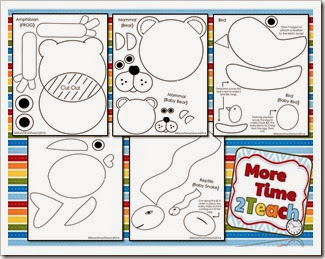 I think that after this project, when my students think of amphibians, they’re going to quickly remember that moist, green baggie. Don’t you think so?
I think that after this project, when my students think of amphibians, they’re going to quickly remember that moist, green baggie. Don’t you think so? 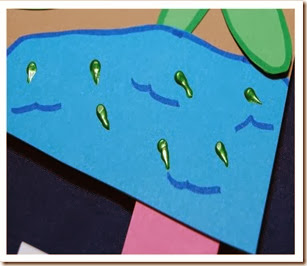 By the way, I can’t forget to mention the tadpoles made of Tulip fabric paint swimming around in the pond. Aren’t they just adorable? I think they’ll remind my students that frogs begin in the water as tadpoles with gills, and develop into frogs with lungs living on the land. Craft-ivity #3 was less complex and involved R-E-P-T-I-L-E-S. I recreated reptile skin with this FABULOUS Gauze Paper I found at JoAnn. It had the perfect texture to remind kids that reptiles have dry, scaly skin. If you look closely at
By the way, I can’t forget to mention the tadpoles made of Tulip fabric paint swimming around in the pond. Aren’t they just adorable? I think they’ll remind my students that frogs begin in the water as tadpoles with gills, and develop into frogs with lungs living on the land. Craft-ivity #3 was less complex and involved R-E-P-T-I-L-E-S. I recreated reptile skin with this FABULOUS Gauze Paper I found at JoAnn. It had the perfect texture to remind kids that reptiles have dry, scaly skin. If you look closely at 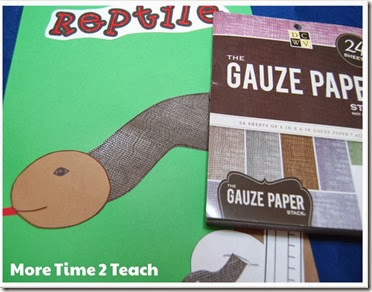 the picture you can see the texture… Imagine what it feels like when you touch it! Rough and dry…perfect for reptiles! I also included a baby hatching from an egg in the bottom since MOST reptiles lay eggs. (NOT all though… Did you know that Pythons are born live?)
the picture you can see the texture… Imagine what it feels like when you touch it! Rough and dry…perfect for reptiles! I also included a baby hatching from an egg in the bottom since MOST reptiles lay eggs. (NOT all though… Did you know that Pythons are born live?) If your students would like, they can even add a small Python in the corner giving birth to live young… Also, notice how I included water and land. I wanted to emphasize that some reptiles live on land and others in water.
If your students would like, they can even add a small Python in the corner giving birth to live young… Also, notice how I included water and land. I wanted to emphasize that some reptiles live on land and others in water.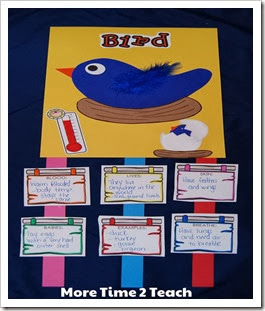 Birds was next… pretty straight forward though. I made a mama bird with its baby bird hatching from an egg and glued a feather to the body to show that birds have feathers. (You could also have your students use construction paper to make a tree branch to show the habitat birds belong in.) I love craft-ivities… I think they’re so much fun…sorry can’t help myself :0)
Birds was next… pretty straight forward though. I made a mama bird with its baby bird hatching from an egg and glued a feather to the body to show that birds have feathers. (You could also have your students use construction paper to make a tree branch to show the habitat birds belong in.) I love craft-ivities… I think they’re so much fun…sorry can’t help myself :0) 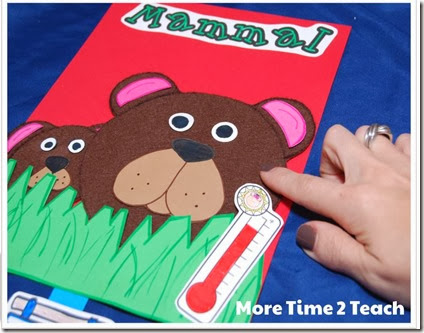 And last but not least, was mammals. I made this adorable, furry mama bear with it’s baby bear hiding in the grass. Aren’t they too cute? To remind students that mammals have fur/hair, I traced the bear’s body onto brown felt. Now students can “pet” their bear and remember what kind of skin mammals have. There you have it, a FUN, & INTERACTIVE Animal Craft-ivity to help your students remember the characteristics of each of the 5 animal groups! I hope you’ve been able to get a few ideas from this post that you can use in your own classroom. If you’d like to checkout a few other projects to help foster creativity in the classroom, these four other teachers will be sharing their ideas during the week. Stop on by and get your creative juices flowing… and let them know I sent you their way :0) Tuesday: Beach Sand and Lesson Plans Thursday: Learning in the Little Apple Friday: Ms. Fultz’sCorner Here’s a coupon to help you out… Just print it out and shop ‘til you drop:0)
And last but not least, was mammals. I made this adorable, furry mama bear with it’s baby bear hiding in the grass. Aren’t they too cute? To remind students that mammals have fur/hair, I traced the bear’s body onto brown felt. Now students can “pet” their bear and remember what kind of skin mammals have. There you have it, a FUN, & INTERACTIVE Animal Craft-ivity to help your students remember the characteristics of each of the 5 animal groups! I hope you’ve been able to get a few ideas from this post that you can use in your own classroom. If you’d like to checkout a few other projects to help foster creativity in the classroom, these four other teachers will be sharing their ideas during the week. Stop on by and get your creative juices flowing… and let them know I sent you their way :0) Tuesday: Beach Sand and Lesson Plans Thursday: Learning in the Little Apple Friday: Ms. Fultz’sCorner Here’s a coupon to help you out… Just print it out and shop ‘til you drop:0)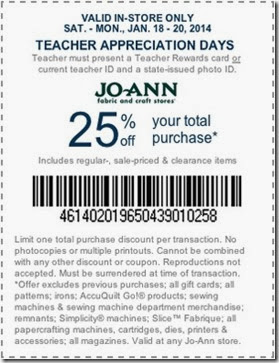 Thanks so much for stopping by…
Thanks so much for stopping by…  (This post includes a review for craft supplies purchased at Jo-Ann Fabric and Craft Stores and is part of a Jo-Ann campaign. I did receive compensation for this review; however, this is my personal and honest feelings based on my experience.)
(This post includes a review for craft supplies purchased at Jo-Ann Fabric and Craft Stores and is part of a Jo-Ann campaign. I did receive compensation for this review; however, this is my personal and honest feelings based on my experience.)
Miscellaneous
Animal Classification Craft-ivity
Previous Story
Stop…Jot.. and Think!
Stop…Jot.. and Think!
Next Story
3 Million Teachers Strong TPT Sale
3 Million Teachers Strong TPT Sale
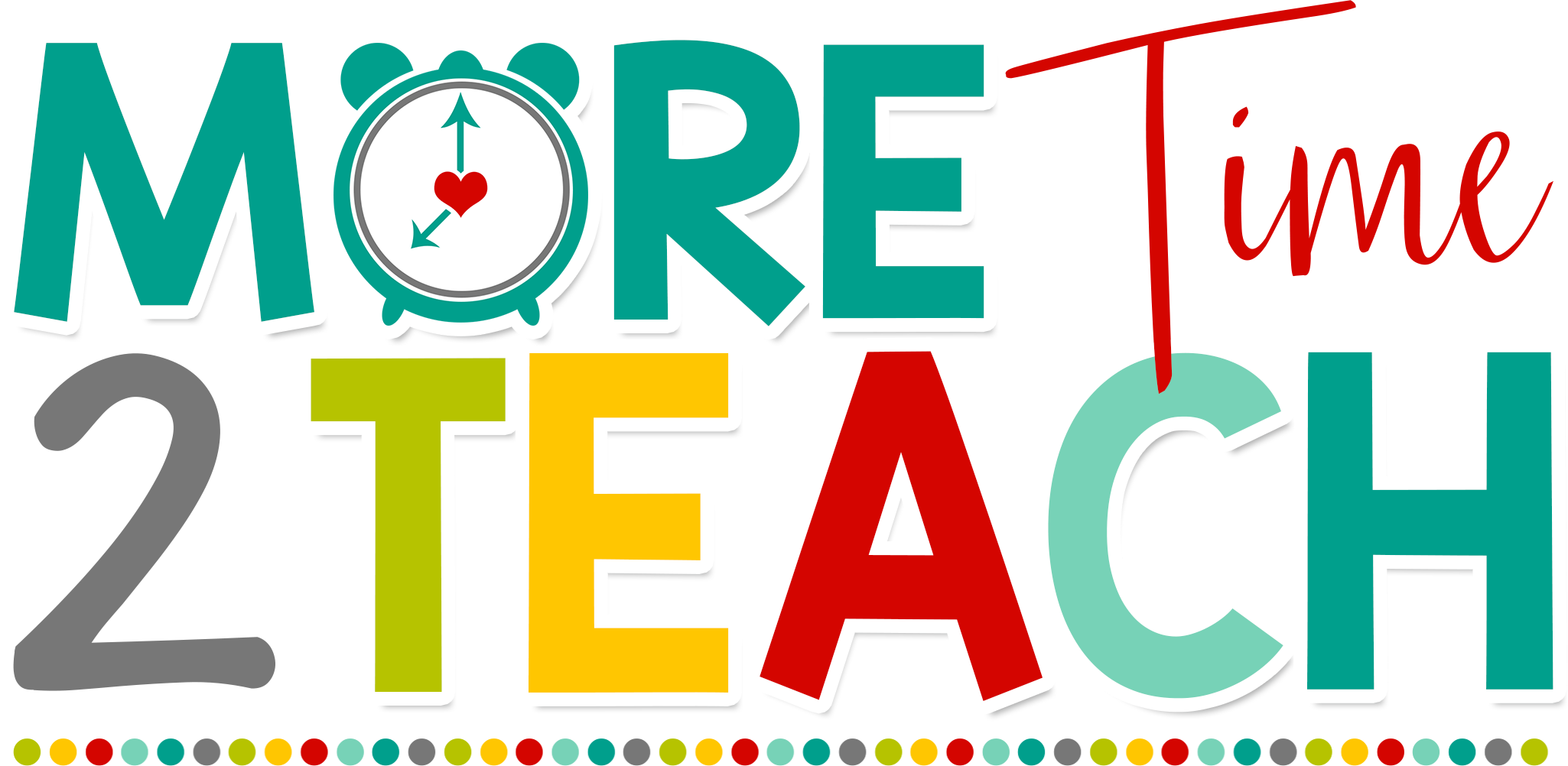

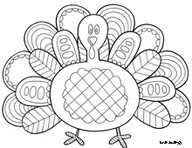
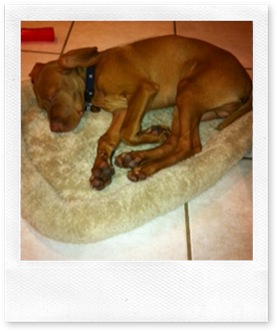
1 Comment
Jane
January 15, 2014 at 11:37 pmThose animals look awesome! I love that scaly paper!
Jane
Learning in the Little Apple